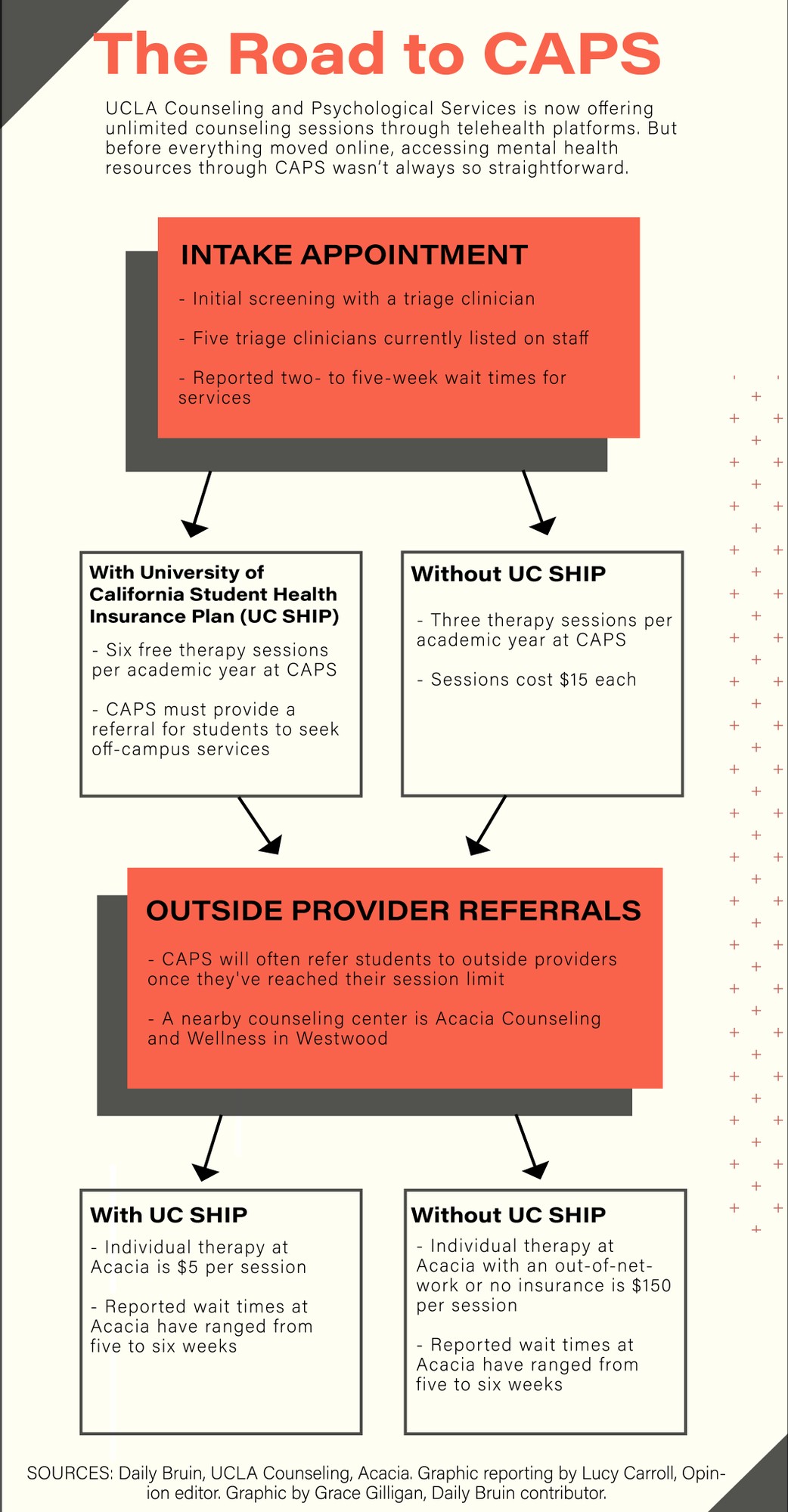UC must work with Anthem to continue telehealth coverage after pandemic ends

By Lucy Carroll
May 27, 2020 3:34 p.m.
Most students are ready to give up Zoom university for their brick-and-mortar campus, and online graduation ceremonies for a diploma hand-off.
Online health services, however, are one thing students can’t afford to give up.
Campuses across the University of California have been thrown into the world of telehealth – and mental health services have arguably experienced the most positive effects as a result. UCLA Counseling and Psychological Services is now able to provide unlimited counseling sessions. At UC Berkeley, they’ve transitioned to the new telehealth platform Teledoc to provide online counseling as well as other services. CAPS at UC San Diego has expanded its hours, helping to accommodate students spread across the world.
The infrastructure seems to be working in the current situation, and individual campuses should continue taking all the steps possible to ensure telehealth services are continued beyond the end of this pandemic.
But more than anything, it’s the UC that will need to prepare itself for a conversation with another organization entirely – Anthem Blue Cross. Anthem is an affiliated insurance vendor for the UC Student Health Insurance Plan, which covers insurance for the student body across all University campuses.
Needless to say, any decision by Anthem affects the UC community. And when it comes to covering telehealth services, it has a big one to make.
In order to ensure continuity of telehealth services beyond the COVID-19 pandemic, health insurance companies will need to be on board. Currently, Anthem Blue Cross is covering online mental health services – but that could change with the advent of a post-coronavirus world. So while individual campuses can take steps to fund CAPS centers and provide resources for sustainable telehealth services, the UC needs to work with Anthem to make sure telehealth isn’t just covered for the current moment.
The unfortunate reality is that, when this pandemic is over, UC students will need telehealth more than insurance companies do.
The major mental health impacts of COVID-19, coupled with an economic downturn that could last for years, means students will need the flexibility to access mental health services outside the rent-burned boundaries of Westwood.
But the decision to continue telehealth services beyond the pandemic will land squarely on the shoulders of insurance companies, said Alexander Young, the interim chair of the Department of Psychiatry and Biobehavioral Sciences and the interim director of the UCLA Semel Institute for Neuroscience and Human Behavior.
“I wouldn’t be surprised if a very large proportion of counseling or therapy remains virtual – in terms of how much it’s going to happen depends in substantial part on the insurance companies and what they will cover,” Young said. “They had, in the past, been reluctant to cover telehealth.”
As of now, Anthem Blue Cross has been vague about its intentions for continuity of telehealth coverage, and its expansion to cover telehealth “until further notice” reeks of ambiguity.
For the present moment, that will do – but the University needs to start pushing them towards a definitive plan of action for the future.
Because if anyone has the leverage to do so in California, it’s the UC.
Anthem Blue Cross California provides student health insurance for all 10 UC campuses, as well as UC Hastings. Starting in 2017, the UC chose Anthem to provide PPOs for staff, faculty and retirees across the system for a three-year contract. In addition, UC Health and Anthem have a partnership under Covered California, the state’s insurance marketplace.
That is to say, the UC is a rather large customer.
And if it’s a customer that chooses to fight for telehealth service coverage, students might actually have the upper hand in getting access to nontraditional care.
On a smaller scale, the institution is ready for a more permanent shift online.
Nicole Green, the executive director of CAPS, said once the technological issues were resolved, the transition to online counseling services went smoothly.
“I can reasonably say there probably will always be, from now on, some reasonable amount of therapy that we might be able to do (online),” Green said. “We now know how to do it and do it safely, and we’ve got the technology up and running.”
If entire schools have adapted this quickly, insurance companies can do the same.
Beyond the logistics, there will be a pressing need for flexibility of care after the pandemic ends. Students may remain scattered and off campus. And with experts now warning of a second wave of the coronavirus later in the year, it is more important than ever for schools to be prepared for an influx of students who need mental health support.
Between the exacerbation of socioeconomic divisions, the effects of xenophobia and the lack of comprehensive health care, the pandemic will have wide-reaching impacts on people’s mental health, Young said.
Ayushi Shroff, a third-year human biology and society student and the executive of Active Minds UCLA, said she thinks the coronavirus has changed the way students talk about mental health.
“It is very topical focused about stress and anxiety about coronavirus, but the discussion on mental health is present – that the suddenness, and uncertainty of the future is definitely affecting our mental health,” Shroff said.
These conversations are important – but without the long-term resource of counseling services, students may never get the professional help they need. And without telehealth services covered by insurance, campuses may never be able to get them that help.
Of course, Anthem is a private company, and it will make its own decisions regarding the continuity of telehealth services. But being the enormous customer it is, the UC has the means to pressure it into continuing telehealth coverage after coronavirus ends.
After all, contracts expire.
And if its insurance company won’t make the right choice, perhaps it’s time the UC go out shopping for new policies.


